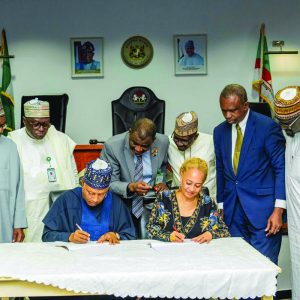Price and exchange rate stability are the foundation of any economy. They promote investor confidence and reduce uncertainty. They also make it easier for businesses to plan, ultimately affecting economic output positively. In fact, every economy works best when there is price stability, which has been the pursuit of the Governor of the Central Bank of Nigeria (CBN), Mr. Olayemi Cardoso, who marks his second year in office on Monday, September 15, 2025.
Cardoso’s two years at the helm of the CBN have no doubt delivered notable progress. Under his stewardship, the central bank has implemented a series of measures aimed at enhancing market transparency, improving financial stability, fostering a more secure investment environment, and shifting towards a market-driven exchange rate regime.
Also, the CBN under Cardoso has remained focused in its fight against soaring inflation by maintaining its hawkish monetary policy stance. By adopting aggressive monetary tightening, the CBN aims to curb excessive money supply, a key driver of inflation. The Consumer Price Index (CPI), which measures the rate of change in prices of goods and commodities, declined for the fourth consecutive month to 21.88 per cent in July, compared to 33.40 percent in July 2024, based on rebased figures. Cardoso made tackling inflation his paramount mission, holding onto orthodox monetary policy with his belief that it is an essential path to achieving sustainable economic growth in the mid-to-long term, as well as improving the standard of living of ordinary Nigerians.

Another notable feat recorded by the CBN Governor in the last two years is the inauguration of the Nigerian Foreign Exchange Code (FX Code), in a strategic step to entrench accountability, compliance, and transparency in the country’s foreign exchange market. This has contributed positively to the stability in the forex market. He also introduced the Electronic Foreign Exchange Matching System (EFEMS), which sets clear and enforceable standards for ethical conduct and governance in the forex market.
The collaborative international outreach missions he initiated on assumption of office, where Nigerian banks work closely with the CBN to engage diaspora communities, has resulted to significant progress, with monthly diaspora remittance inflows rising from $250 million to $600 million.
Owing to this, some Nigerian banks have once again started allowing customers to make international payments using their naira-denominated debit cards, following a long pause due to foreign exchange pressures.
Cardoso has also made it clear that he is targeting $1 billion remittances inflow by 2026, working with the commercial banks.
Furthermore, the CBN has also issued a fresh directive mandating all participants in the country’s payment ecosystem to complete migration to the ISO 20022 messaging standard and implement mandatory geo-tagging of payment terminals by October 31, 2025. It also introduced mandatory geo-tagging of payment terminals to enhance oversight and curb fraud in the electronic payments space and all existing and newly deployed payment terminals are required to have native geolocation services enabled, supported by double-frequency GPS receivers. This followed allegations that some PoS operators support payment of ransom to criminals and this move is expected to help curb the menace.
From the beginning, one of the battles Cardoso faced was to put an end to the commoditisation of the Naira, which was partly responsible for the fluctuation in the value of the currency.
Also, in the last two years, Cardoso has pulled the CBN away from direct development finance interventions into more limited advisory roles that support economic growth, with a firm belief that Ministries, Departments, and Agencies of government responsible for such roles should be allowed to take the lead. He has also been working with the fiscal authorities to see to Nigeria’s delisting from the FATF Grey List, an announcement being expected in the coming days.
There has also been a visible improvement in monetary-fiscal coordination as the Fiscal and Monetary Policy Coordination Framework (FMPCF) has continued to work towards improving synergy between monetary and fiscal policies, in order to achieve better economic management. The Financial Services Regulation Coordinating Committee (FSRCC) has also been strengthened with regular inter-agency meetings and collaborations.
The CBN Governor has also demonstrated a steadfast commitment to strengthening the financial system. This saw the introduction of new guidelines for dormant accounts, the suspension of processing fees to encourage cash deposits, and the advanced use of Early Warning Systems.
He has also initiated a banking recapitalisation exercise that seeks to increase the capital requirements for banks operating in Nigeria across the different licence categories, with a deadline of March 31, 2026. Options include equity issuance, mergers, or license adjustments. The new minimum capital base for commercial banks with international licences is N500 billion, while that for commercial banks with national licences is N200 billion. A N50 billion minimum is required for commercial banks with regional licences; for merchant banks with national licences N50 billion; and for national and regional non-interest banks, the base is N20 billion and N10 billion, respectively. At the beginning of the exercise, the estimated required capital gap was about $4.1 trillion and so far the banks have raised $2.8 trillion.
The CBN Governor has also engineered internal reforms at the CBN since he assumed office, chief among which is the development of a solution in-house that has made the whole approval process across the central bank paperless. This has reduced approval time, enhanced efficiency, and prevented manipulation of data.
Nevertheless, despite these gains, the CBN is still far from where it ought to be. Inflation remains stubbornly high, exchange rate pressures persist, and structural weaknesses in the banking sector continue to test resilience, especially in the face of tension in the global economy. That is why as he looks ahead to the remaining three years of his tenure, the real challenge for Cardoso will be consolidating early successes while driving deeper reforms that can strengthen monetary stability, enhance financial inclusion, and restore the CBN’s role as a trusted anchor of Nigeria’s economic growth. The CBN must remain vigilant to protect the gains it has recorded so far.
Today the country operates with two versions of the N1000, N500 and N200 notes, a fallout of the Naira redesign policy of his predecessor. This cannot continue forever and Nigerians are looking up to the CBN to fix a terminal date for the phasing out of the older banknotes. Also, Cardoso needs to look into the CBN’s policy on cash management and ensure that it is implemented to improve the distribution of cash in the country, while working with the security agencies to halt the trading of mint Naira notes at social gatherings across the country.
Another important area Cardoso has to focus on going forward is the payment system. Nigeria’s payment system has improved significantly over the past two decades, and in some respects, its regulatory framework has really not kept pace with that movement. Today, some fintechs are bigger than some commercial banks. Therefore, the CBN has to be mindful of the way it relates with them to ensure that they are carrying out their activities in the best interest of their customers and the country.
Technology has been a key catalyst for the growth and development of institutions globally. Also, the adoption of artificial intelligence has created new possibilities and pathways for the delivery of financial products and services for both regulators and operators. That is why internally, beyond the digitisation of its approval process, it must fully embrace technology as well as encourage innovation among its staff. It must also encourage thought-leadership, manpower development, and capacity building from bottom to the top.
From the foregoing, while challenges remain, Cardoso’s steady approach and commitment to long-term solutions is laying the groundwork for a more resilient financial sector. As he enters the next phase of his journey, Nigerians and stakeholders alike are optimistic that his leadership will continue to drive innovation, stability, and trust in the nation’s banking system.
Stay ahead with the latest updates!
Join The Podium Media on WhatsApp for real-time news alerts, breaking stories, and exclusive content delivered straight to your phone. Don’t miss a headline — subscribe now!
Chat with Us on WhatsApp






